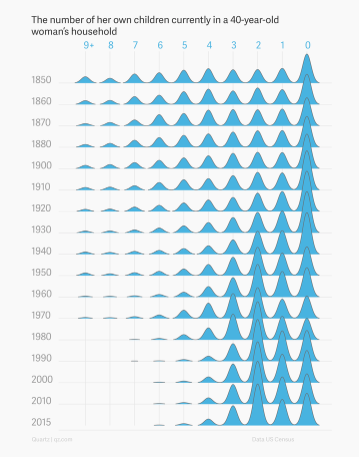In 1850, it was common for families to have anywhere from 6-9 children!  A driving incentive was that, “… children were considered an economic asset: with enough kids, parents could rest assured that at least some would survive and care for them in old age.” (Quartz, Oct. 11, 2017) You can see in this chart from Quartz (from the US Census) that parents had fewer and fewer children with each passing decade.
A driving incentive was that, “… children were considered an economic asset: with enough kids, parents could rest assured that at least some would survive and care for them in old age.” (Quartz, Oct. 11, 2017) You can see in this chart from Quartz (from the US Census) that parents had fewer and fewer children with each passing decade.
This steady decline of US birthrates has continued. There’s been lots of news on this recently. The New York Times recently had professional survey firm, Morning Consult, conduct a new poll of young adults to determine why they are having fewer children. They surveyed over 1,800 men and women, ages 20-45. What they found was that in 2017, the number of births in the US birth was at its lowest number in 30 years. And down a full 2% from 2016.
Why Are We Having Fewer Children?
As in decades past, it’s still a financially-based decision. While our ancestors saw children as an economic asset, they are now more of an economic burden. The rising cost of childcare was the top-rated explanation for scaling back on family size, as reported in this Fortune article (July 6, 2018).
Other reasons included the desire to spend more time with their existing children. Many others had fears about the country’s economic instability. It’s hard to plan for the future needs of their children over the next 20 years when their current finances no longer feel secure.
Fewer Children Means Fewer Caregivers
If we were still living in large families, there would be plenty of hands available to take care of everyone. From the babies through the great-grandparents. In 2018, however, our family size has shrunk considerably. There are fewer family members available to provide the daily care.
Who is going to take care of you when you need more help? The numbers tell us that it is unrealistic to depend on our kids.
If you’re ready to get some peace of mind over your future long term care needs, click here for your free, no-obligation quote for long term care insurance.


 Thanks for visiting my site! I like hearing from you!
Thanks for visiting my site! I like hearing from you!
Leave a Reply